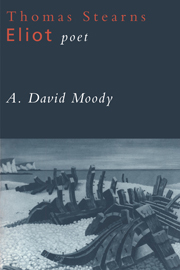Book contents
- Frontmatter
- Contents
- Acknowledgments
- Preface to second edition
- Introduction
- 1 The growth of the poet's mind
- PART ONE 1905–1912 – AN INDIVIDUAL TALENT
- Oxford University Extension Lectures
- PART TWO 1912–1922 – ‘SHALL I AT LEAST SET MY LANDS IN ORDER?’
- 3 Gerontion, and the historical sense
- 4 Tiresias transformed
- PART THREE 1922–1930 – ‘ORDINA QUEST’ AMORE, O TU CHE M' AMI'
- PART FOUR 1931–1939 – THE WORD IN THE DESERT
- PART FIVE 1939–1945 – APOCALYPSE
- AFTERWORDS
- APPENDICES
- Notes
- Index
4 - Tiresias transformed
Published online by Cambridge University Press: 05 February 2012
- Frontmatter
- Contents
- Acknowledgments
- Preface to second edition
- Introduction
- 1 The growth of the poet's mind
- PART ONE 1905–1912 – AN INDIVIDUAL TALENT
- Oxford University Extension Lectures
- PART TWO 1912–1922 – ‘SHALL I AT LEAST SET MY LANDS IN ORDER?’
- 3 Gerontion, and the historical sense
- 4 Tiresias transformed
- PART THREE 1922–1930 – ‘ORDINA QUEST’ AMORE, O TU CHE M' AMI'
- PART FOUR 1931–1939 – THE WORD IN THE DESERT
- PART FIVE 1939–1945 – APOCALYPSE
- AFTERWORDS
- APPENDICES
- Notes
- Index
Summary
a disgust like Dante's is no hypertrophy of a single reaction: it is completed and explained only by the last canto of the Paradiso. The contemplation of the horrid or sordid or disgusting, by an artist, is the necessary and negative aspect of the impulse toward the pursuit of beauty. But … the negative is the more importunate.
Its motive is truly the death motive, for it is the loathing and horror of life itself.
The Waste Land is to ‘Dans le Restaurant’ as the oak-tree to the acorn. At its heart is likewise an intense moment of passion, ‘ecstatic or terrible’, now removed into memory; and it operates a similar process of conscious analysis and expansion, to the point at which the objective predicament is resolved into a new order of feeling. There are of course great differences, as between a minor and a major work. In The Waste Land the historical sense is fully developed, so that the poet is struggling to unify a vastly more inclusive and complex sensibility. Moreover, he reaches to a further stage in his development: Phlebas' death by water is no longer the end, but the transition to an order of poetry wholly new in Eliot's work.
To follow out that development, and to read the poem as an organic whole in which ‘What the Thunder Said’ follows from and fulfils the rest, we need to keep our attention upon the poet within the poem.
- Type
- Chapter
- Information
- Thomas Stearns Eliot: Poet , pp. 79 - 112Publisher: Cambridge University PressPrint publication year: 1995



